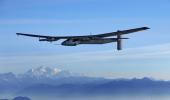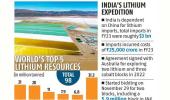EO Data: $3 Trillion Economic Benefits & CO2 Reduction - WEF Report
Earth observation (EO) data can generate $3 trillion in economic benefits and help eliminate 2 gigatonnes of CO2 emissions annually by 2030, according to a new World Economic Forum report.

Photograph: Arnd Wiegmann/Reuters
New Delhi, May 7 (PTI) Earth observation data can generate over USD 3 trillion in economic benefits globally and help eliminate two gigatonnes of greenhouse gas emissions annually by 2030, according to a new report by the World Economic Forum.
Earth observation data refers to the collection, analysis, and presentation of information about the Earth's physical, chemical, and biological systems using remote sensing technologies.
The report, created in partnership with Deloitte and endorsed by industry and climate leaders, emphasised that EO data is a crucial tool for economic growth and sustainability.
While certain sectors like agriculture, energy, and finance are expected to benefit the most from EO data, nearly all industries can gain insights to improve operations and reduce environmental impact.
For example, farmers can use EO data to enhance crop yield and sustainability practices, while insurance companies can better understand and mitigate environmental risks.
The report predicted that the global value of EO data could grow from USD 266 billion at present to over USD 700 billion by 2030. This could lead to a cumulative USD 3.8 trillion contribution to global GDP and help eliminate 2 gigatonnes of greenhouse gas emissions annually equivalent to the estimated combined annual emissions of 476 million gasoline-powered cars.
The Asia Pacific region is poised to capture the largest share of EO's value by 2030, reaching a potential value of USD 315 billion, while Africa and South America are positioned to realise the largest percentage growth.
However, challenges such as limited awareness, talent shortage, and fragmented standards hinder the widespread adoption of EO data. To fully realise its potential, collaborative efforts and informed policies are needed to stimulate demand, advance technology, and establish key standards, the report said.
"Earth observation is a vital component of the Fourth Industrial Revolution," said Jeremy Jurgens, Managing Director and Head of the Centre for the Fourth Industrial Revolution at the World Economic Forum. "It converges with artificial intelligence, digital twins and climate technology to offer a powerful toolset for economic prosperity and sustainable growth."
"Earth data can play an instrumental role in helping organizations understand their impacts and dependencies on nature, comply with sustainability regulations and shape strategies that contribute to a nature-positive and net-zero economy," said Jennifer Steinmann, Deloitte Global Sustainability leader.
Earth observation data refers to the collection, analysis, and presentation of information about the Earth's physical, chemical, and biological systems using remote sensing technologies.
The report, created in partnership with Deloitte and endorsed by industry and climate leaders, emphasised that EO data is a crucial tool for economic growth and sustainability.
While certain sectors like agriculture, energy, and finance are expected to benefit the most from EO data, nearly all industries can gain insights to improve operations and reduce environmental impact.
For example, farmers can use EO data to enhance crop yield and sustainability practices, while insurance companies can better understand and mitigate environmental risks.
The report predicted that the global value of EO data could grow from USD 266 billion at present to over USD 700 billion by 2030. This could lead to a cumulative USD 3.8 trillion contribution to global GDP and help eliminate 2 gigatonnes of greenhouse gas emissions annually equivalent to the estimated combined annual emissions of 476 million gasoline-powered cars.
The Asia Pacific region is poised to capture the largest share of EO's value by 2030, reaching a potential value of USD 315 billion, while Africa and South America are positioned to realise the largest percentage growth.
However, challenges such as limited awareness, talent shortage, and fragmented standards hinder the widespread adoption of EO data. To fully realise its potential, collaborative efforts and informed policies are needed to stimulate demand, advance technology, and establish key standards, the report said.
"Earth observation is a vital component of the Fourth Industrial Revolution," said Jeremy Jurgens, Managing Director and Head of the Centre for the Fourth Industrial Revolution at the World Economic Forum. "It converges with artificial intelligence, digital twins and climate technology to offer a powerful toolset for economic prosperity and sustainable growth."
"Earth data can play an instrumental role in helping organizations understand their impacts and dependencies on nature, comply with sustainability regulations and shape strategies that contribute to a nature-positive and net-zero economy," said Jennifer Steinmann, Deloitte Global Sustainability leader.
You May Like To Read
TODAY'S MOST TRADED COMPANIES
- Company Name
- Price
- Volume
- Vodafone Idea L
- 8.25 (+ 1.85)
- 118381374
- Standard Capital
- 0.55 (+ 3.77)
- 26210368
- G G Engineering
- 0.98 (+ 8.89)
- 13834917
- AvanceTechnologies
- 0.63 (+ 16.67)
- 13799975
- Sharp Investments
- 1.14 (+ 20.00)
- 10867888







 © 2025 Rediff.com India Limited. All rights reserved.
© 2025 Rediff.com India Limited. All rights reserved.